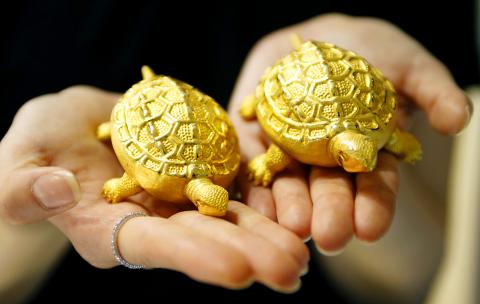South Korea spent more than US$1 billion in its first gold purchase in more than a decade, as uncertainty about global growth and sovereign debt push central banks around the world to diversify foreign reserves.
A brittle global economic recovery and precarious debt conditions in the US and Europe have boosted the safe-haven appeal of gold, lifting the bullion to a record high on Friday.
The Bank of Korea said in a statement yesterday it bought 25 tonnes of gold over the past two months, raising its gold holdings to 39.4 tonnes, news that helped lift spot gold by about US$6 from late Monday.

Photo: Reuters
Reserve currencies, like the US dollar and euro, “have been losing their clout since the recent global financial crisis partly due to abnormal monetary policy adopted in many countries and fiscal deficit problems,” said a central bank official who declined to be named because he was not authorized to speak to the media.
Data on 27 major economies from the Bank for International Settlements shows the US dollar’s inflation-adjusted real effective value has dropped by 10 percent in the past two years and the euro has lost 6 percent, reflecting the sharp increase in the amount of each currency in circulation.
South Korea’s gold holdings remain far smaller than that of other Asian central banks, with China, which ranks sixth globally, the biggest with 1,054.1 tonnes by the end of May, according to World Gold Council data.
Japan, No. 9 globally, has 765.2 tonnes of gold, or 3.3 percent of its total reserves, and 11th-ranked India has 557.7 tonnes, or 8.7 percent.
With prices hovering near historic highs, the central bank of Asia’s fourth-largest economy said gold looked less lucrative as an investment, but it was the right time to buy the precious metal because its foreign reserves had risen above US$300 billion.
The news helped boost gold prices, with spot up 0.4 percent at US$1,623.94 an ounce at 5:28am. Gold hit a record high of US$1,632.30 on Friday.
“Any news about central banks buying gold reassures consumers and other major players who are already looking at gold as an investment,” said Jeffrey Pritchard, an analyst at California-based commodities futures and options brokerage Altavest Worldwide Trading.
The increased gold holding would put South Korea in 45th position in the World Gold Council’s list of central banks holding gold, up from 56th previously, the Bank of Korea said.
The US has the biggest gold holding in its reserves, at 8,133.5 tonnes, or 74.7 percent of total reserves, according to the council’s report last month. Germany is a distant second with 3,401 tonnes, or 71.7 percent of its total reserves.

Nvidia Corp chief executive officer Jensen Huang (黃仁勳) on Monday introduced the company’s latest supercomputer platform, featuring six new chips made by Taiwan Semiconductor Manufacturing Co (TSMC, 台積電), saying that it is now “in full production.” “If Vera Rubin is going to be in time for this year, it must be in production by now, and so, today I can tell you that Vera Rubin is in full production,” Huang said during his keynote speech at CES in Las Vegas. The rollout of six concurrent chips for Vera Rubin — the company’s next-generation artificial intelligence (AI) computing platform — marks a strategic

Enhanced tax credits that have helped reduce the cost of health insurance for the vast majority of US Affordable Care Act enrollees expired on Jan.1, cementing higher health costs for millions of Americans at the start of the new year. Democrats forced a 43-day US government shutdown over the issue. Moderate Republicans called for a solution to save their political aspirations this year. US President Donald Trump floated a way out, only to back off after conservative backlash. In the end, no one’s efforts were enough to save the subsidies before their expiration date. A US House of Representatives vote

REVENUE PERFORMANCE: Cloud and network products, and electronic components saw strong increases, while smart consumer electronics and computing products fell Hon Hai Precision Industry Co (鴻海精密) yesterday posted 26.51 percent quarterly growth in revenue for last quarter to NT$2.6 trillion (US$82.44 billion), the strongest on record for the period and above expectations, but the company forecast a slight revenue dip this quarter due to seasonal factors. On an annual basis, revenue last quarter grew 22.07 percent, the company said. Analysts on average estimated about NT$2.4 trillion increase. Hon Hai, which assembles servers for Nvidia Corp and iPhones for Apple Inc, is expanding its capacity in the US, adding artificial intelligence (AI) server production in Wisconsin and Texas, where it operates established campuses. This

US President Donald Trump on Friday blocked US photonics firm HieFo Corp’s US$3 million acquisition of assets in New Jersey-based aerospace and defense specialist Emcore Corp, citing national security and China-related concerns. In an order released by the White House, Trump said HieFo was “controlled by a citizen of the People’s Republic of China” and that its 2024 acquisition of Emcore’s businesses led the US president to believe that it might “take action that threatens to impair the national security of the United States.” The order did not name the person or detail Trump’s concerns. “The Transaction is hereby prohibited,”